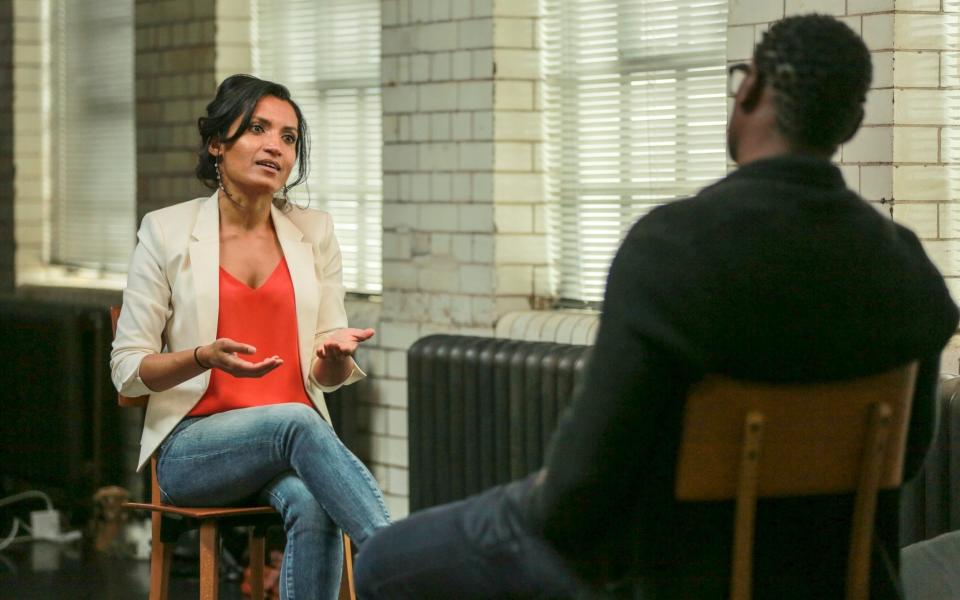Why is Covid Killing People of Colour? review: David Harewood's report was staggering

- Oops!Something went wrong.Please try again later.
Actor David Harewood has become a bracing new voice in factual film-making over the past five years. This surprising turn to the Homeland star’s career began with his 2016 documentary about discrimination in education and politics, Will Britain Ever Have a Black Prime Minister?.
This was followed in 2019 by his deeply personal film Psychosis and Me, which charted his own breakdown aged 23 with breathtaking honesty and explored the stigma of mental illness among black men.
Now Harewood turned his new-found documentarian skills to a timely topic. In Why is Covid Killing People of Colour? (BBC One), he investigated the reasons for the far higher death rate of coronavirus patients from black, Asian and ethnic minority backgrounds. What has the pandemic exposed about health inequality in modern Britain? The result was an eye-opening hour, full of appalling disparities and affecting stories.
Harewood knows from his own tough experience of being sectioned that black patients are 10 times more likely to experience a psychiatric disorder. Now he discovered a host of other health issues faced disproportionately by people of colour – a scandalous pattern that’s been mimicked once again during the year-long Covid crisis.
He began in the London borough of Brent, where Covid has had a devastating impact on the racially diverse community, with a death rate five times the national average. “How can an illness discriminate this much?” Harewood asked, clearly moved by what he heard from locals.
His report was underpinned by research from paediatrician Dr Guddi Singh, an expert in health inequality. She hit Harewood with a barrage of statistics highlighting the disproportionate impact of Covid-19 on ethnic minorities. The rate with which people of colour were admitted to intensive care, Singh explained, was 2.5 times higher than whites. The virus was indisputably hitting BAME communities harder and faster.
Equally stark was the impact of heightened risks on frontline employees and the NHS workforce. A startling 63 per cent of the health workers and a dizzying 95 per cent of the doctors who’ve died from Covid were people of colour. There was evidence that one factor here was that they feel less empowered to ask management for proper PPE. Our health service relies on the work of BAME staff but shamefully, many of them feel less safeguarded.
Harewood examined the theory that vitamin D deficiency might play a part and looked at the role played by underlying health conditions more prevalent among ethic minorities. Harewood himself suffers from asthma, hypertension and chronic kidney disease. As a 55-year-old black man, he was three times as likely to die from Covid-19 than his white friends of the same age. “This virus seems to have my name on it, which is worrying,” he said.

He traced the unarguable connections between health and deprivation – from poverty, diet and housing to poor air quality – and interrogated the idea that structural racism might influence not only where we live and the jobs we do, but the treatment we receive from the NHS itself. “As well as a biological pandemic, there’s a racist one,” Harewood sighed wearily. “We’re battling not just one virus but two.”
Poignantly, he met families who’ve lost loved ones to Covid or other conditions known to adversely affect non-white communities. These included the daughter of a mental health worker sent to work in unsafe conditions, a mother who lost her nine-year-old daughter to asthma because they lived near a busy road and another whose daughter died in childbirth – a fate which, shockingly, is five times more likely to befall black women.
Harewood even dipped into the radical school of thought in the US which argues that experiencing racism can affect health all on its own. Fascinatingly, Professor Arline Geronimus outlined her theory that prejudice takes a physical toll due to constant stress eroding the immune system – a phenomenon she has termed “weathering”.
This was thoughtful, hard-hitting fare. The facts and figures Harewood highlighted were frequently staggering. The narrative occasionally lost its focus on Covid-19 and fanned outwards to wider issues but was no less powerful for it. Harewood was impassioned but impressively measured as he tackled often uncomfortable truths.
The only time his composure slipped was during a climactic confrontation with Equalities Minister Kemi Badenoch. She dismissed the notion that systemic racism played a part in health or educational inequality, while Harewood simmered with frustration and righteous anger. Badenoch’s government colleagues would have done well to watch this fine documentary with a more open mind.
“If those in power don’t acknowledge the damage that systemic racism is doing to the health of millions of people, we face an uphill struggle to affect positive change,” Harewood concluded. “Our society still operates in ways that disadvantage black people – a truth that Covid-19 has ruthlessly exposed. But if any good can come out of this crisis, it’s shining a light on health inequalities that cannot be ignored.”

